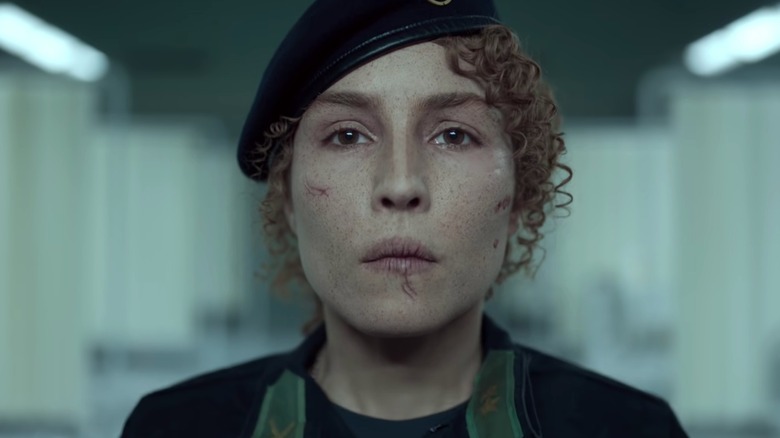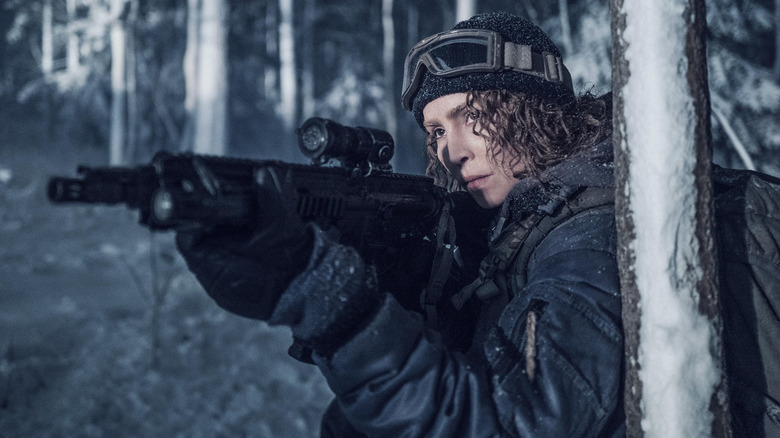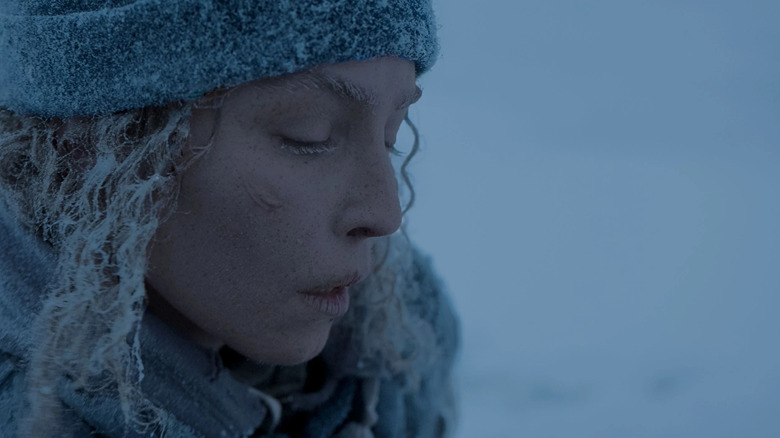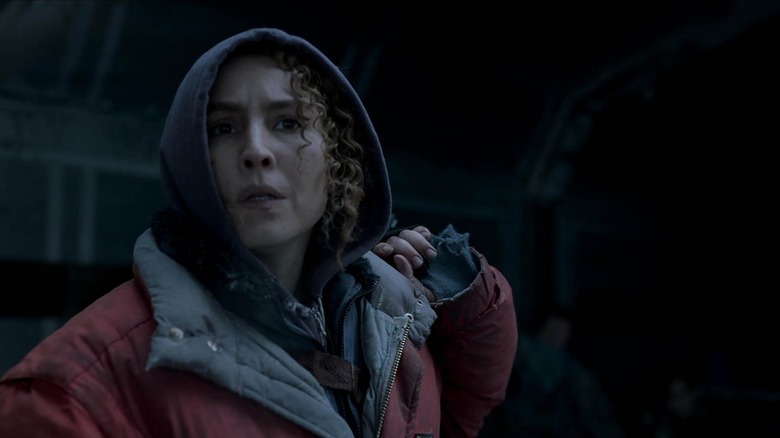Black Crab Star Noomi Rapace On Breaking Her Nose On Set, Learning To Ice-Skate, And More [Interview]
Noomi Rapace is giving it her all on screen. Whatever the job, whatever the movie, she does not want to disappoint. Rapace, as she says, owes that level of commitment to passionate movie fans partly because she, too, is a passionate movie fan. (Believe it or not, but not all actors are.) The actress pushes herself, and sometimes even scares or injures herself, often in physically taxing roles, such as her latest part in Adam Berg's war film, "Black Crab."
Ever since breaking out as Lisbeth Salander in the Swedish version of the "Dragon Tattoo" trilogy, Rapace hasn't repeated herself. In the last year alone, she has starred in "Black Crab," "The Trip," and "Lamb," three movies that couldn't call for three more different performances. No matter the movie, genre, or character, though, Rapace is always seeking questions, not answers, in the work she's doing. Recently, the actress told us about her ambitions, her process, and oddly enough, dubbing herself for the first time in "Black Crab."
'It was intense'
Looking at the last year and your career in general, your choices are unpredictable, but do you find a common interest or appeal in the movies you choose to do?
I would say there's always a question that I feel I want to answer that I don't know. For "The Trip," first of all, I wanted to have fun with my friends. It was a fun movie to shoot. And then I was like, "Would I go so far that I could hate my boyfriend or my husband so much? I wish I killed him and then have to make a total U-turn and save him." I was like, "Hmm, I want to ask myself that." With "Lamb," [the question was] "How do you mend, how can you heal, if you lose a child, which is the worst thing I can possibly imagine? How would you find a way out of that locked off emotional room? Could you find yourself loving a creature that is not fully human? How far would I go to reenact and live the motherhood again and to be a parent again, to try to heal that wound?"
I think I always need to find a question that I want to try to answer. Sometimes there is no answer. Sometimes there's just a question that I'm trying to ask myself, but I don't want to repeat myself. I guess that's why I try to challenge myself and always put myself in a situation when it feels a bit scary to be.
What were your questions for "Black Crab"?
If you had the chance to save a lot of lives and sacrifice your own life and actually save a lot of people with you, [would you do it]? I would like to say, "Yeah," but I don't know. You want to think that you're a good human and that you have good values and that your ethics and morals are in the right place, but then you never know. I'd like to battle those things. I sometimes play this game when I zoom out and look at myself from above, like, "Who is this woman? Who is Noomi? How is she interacting with her friends? How does she treat her colleagues? What kind of mother is she? Would I like her? Would I like to hang out with her?" Hopefully, the answer is yes, but sometimes you need to work on yourself a bit, lady.
[Laughs] Those are good questions people should ask themselves.
Exactly, because sometimes it's not the right day to ask the question. I'm back tomorrow.
We could all say, at some point, "Oh, I don't want to hang out with me at that time."
Oh yeah. I mean, that's been the answer to myself a few times. I was like, "I don't like that side," and then that is the side that I discovered that I need to work on a bit. I was so restless when I was younger and especially on film sets, I wanted everything to happen now. When I did "Lamb" and it's like, I'm working with babies and lambs. There's a waiting game. We're waiting for a lamb baby to fall asleep and everyone is being quiet and finally the lamb is sleeping and I'm tiptoeing in and they give me the lamb baby and, "Roll camera and action." And then, the lamb wakes up and goes "Baaa." OK, cut. I had to work on my patience. There was a moment when I looked at it like, "Don't put so much pressure on everyone. Relax, chill a bit more." I've been having those moments when I need to correct myself and work on me.
Thank you for sharing that. So, Adam Berg says "Black Crab" isn't a big movie.
I mean, it is a big movie for being in Scandinavia.
It often looks like a big movie.
Yeah. I felt we had everything against us. It was so cold. I've never ice-skated before. So just becoming a skater, to learn how to function and be free and move and shoot, then act on the ice. And then the weather conditions were really hard. You covered up a lot of times. There's not much you actually see and you don't have a lot of words to communicate with, so you had to find those moments, the gaps, really use the moments you had to show vulnerability, to show that she's a real human fighting to find her daughter to survive and make her as real as possible. Even though some days I just felt I'm falling apart. I was so exhausted. It was intense.
'Sometimes it hurts a lot'
Is shooting on ice as rough as shooting underwater?
No. You know what, I'm scared. I'm scared of the ice and I'm scared of water. I don't want to be in the water, either. When we did the underwater scene, it's a big fear for me to overcome. You jump in with your clothes on. The clothes get heavy and the shoes are heavy, and it's pulling you down. There's always something I need to overcome. There's always something. I was like, "Oh, this is too scary," and then I have to go there and challenge myself and see if I can push myself through it.
After "Close," where you also had to do underwater scenes, did it get any easier?
I think so. I think it's always good, you do grow a little bit every time. Funny that you mention "Close," because they came to me on "Black Crab" and they were like, "Oh, but you've done underwater stuff. You're good, right?" and I was like, "Oh, no." I'm still scared. It's not like you heal that part, "Now it's good, now I can do underwater stuff forever." I think sometimes you take one step forward and then it's two backs. You need to be active in working on your fears.
Some actors say no matter how much experience you have with action and stunt coordinators, it's always different. Has that been your experience?
Yeah. Things can go wrong. You never know. On "Black Crab," I broke my nose. The second week of filming there was an accident on set. I got the camera in my face and I broke a double fracture on my nose and a concussion. There's nothing we can do. We have to pause production. I was stitched up. I was in bed healing and doing tests, going to the hospital, checking, "How bad is the concussion?" Doing scans, and then we were dealing with the scar. They take the stitches out, but still have scars. Things can go wrong, but then you have to overcome that. So, a lot of people think that it's all fake, but it does hurt. Sometimes it hurts a lot.
You're one of the rare actors who actually asks for their lines to get cut. If it's redundant to the story, you don't want to say it, right?
Yeah. I mean, Jack, I feel most people are not stupid. I feel a lot of movies treat the audience as they're dumb, [but] everything doesn't need to be said. There's so much communication that is so much more than words. It was something I enjoyed in "Lamb." It's very little dialogue. When you don't talk, you start to tap into different forms of communication. I was reading the features of the lamb and how she was breathing and how her nose was moving and when she showed her teeth a little bit, that's kind of a language you're communicating and you start to be aware of sounds and smells and hormones and energies when you don't overfill everything with words. I think overwritten scripts, it's a combination of laziness and you think that the audience is not smart enough.
It's disappointing as an audience member to hear those lines, but it sounds more disappointing to have to deliver those lines.
For sure. Also, it's the same with a soundtrack when if it's a sad scene, you don't need a lot of sad music. Just do happy music then, it's so obviously a sad scene. I feel I'm always trying to avoid those things because the audience is smart. They will understand. I like contradictions. In real life, when I'm really sad, I'm laughing. I don't put on classical sad music instead of crying. It's like, you kind of go against it normally.
'I love 'Strange Days''
In those silences you mentioned, Adam said there's such an intensity that you project. For you, where does that intensity come from?
I think when I discovered the world of cinema, when I was a young teenager, it was my source of oxygen. I think it saved my life. I felt less lonely in the world. I felt seen, I felt heard, I felt connected. I think I feel so honored and so lucky to be a part of this and to be an actor that is allowed to do all this and to be existing and living in that.
I love it so much, but it's also necessary. It's my oxygen. I don't really have gray zones, which can be difficult sometimes. I feel sometimes I'm like, "You have to learn maybe everything is not black and white," but I think the passion and the love I have for films makes me feel I need to give it all because I want to deserve to be here. I feel I owe it to the audience, to you. You take time and watch my films. I want to give you my all.
You see that in the work. I mean, you don't make "Lamb” as someone who doesn't love movies. Speaking of which, that was a great movie to experience with an audience, seeing how they reacted. With "Black Crab" and other Netflix films you've done, do you miss that theatrical experience at all?
I love going to the movies. I love sitting down as a bunch of people, people eating popcorn and the lights go down and some annoying dude having his cell phone on behind you. Shut it off. But I love being in the room together with people. "Black Crab" was in a film festival in Gothenburg. I was sitting in a full room of 800 people or something, and it was really interesting to see the reactions.
Now, that is always the amazing thing about working with Netflix. I remember that, I think "What Happened to Monday" came out and all of a sudden, there were millions of people that saw it in a week. It was crazy. So many people, from South Korea to Brazil to Cape Town. A girl in Cape Town and a boy in L.A. can watch it simultaneously. That is powerful and magical, but I would love to have the best of both, ideally.
Some people will discover certain movies, like "The Trip," more easily, too.
Yeah, and I think not all movies need to be on a big screen. I think "The Trip" is a fun, crazy ride. I had fun making it and it's perfect for Netflix. I think you will have different life forms, but "Black Crab" is so visual and so poetic. Ideally, maybe in the future you can have a festival where Netflix does the best of their pics and people can see it on a big screen. If I was just a wizard and could decide, I would say, "Okay, let them be out in the theaters and be on Netflix at the same time and people can choose."
You dubbed yourself in "Black Crab." What is that experience like? Is it surreal?
I mean, I was doing press for "The Girl with the Dragon Tattoo" in, I think, Paris, and I was on a talk show. They showed me a clip, like, "We're going to show you a clip of 'The Girl with the Dragon Tattoo'." I'm sitting and I [heard] a French voice and I was like, "Wait, wait, what? That's not my voice." I didn't know. I didn't expect it. I had my face to drop. I was like, "Is that my voice? That doesn't even sound like me."
They do in a lot of countries. I mean, I have a German voice, I have different voices. Now, this was the first time it was my voice, me dubbing myself. It was really strange. I was in the studio. Some words, like "OK," it's the same, but it is weird. I'm so used to reading subtitles because we have that here in Scandinavia. I grew up watching American films and reading subtitles. I'm used to it. It's how I prefer to watch films. For example, "Parasite," that I love. I've seen it a couple times and when it's the second time, you can go more freely between faces and reading and you get used to it. It's strange, but I can also understand that some people just want to look at their faces all the time and not read.
Earlier you said how discovering movies as a teenager was life-changing. What were some of those movies that made a big impact?
I had a huge crush on Patricia Arquette. I watched everything with her. I think I discovered her in "True Romance," and then Ridley Scott, and then after that I went into "Indian Runner," and then from "Indian Runner," I discovered Viggo Mortensen and then I kind of started following him. So it was almost a puzzle, a chain, I saw a film with someone I loved and then that led me to discovering that person in another film. Some films I kept watching over and I'll follow the lead. All those classics. I love "Strange Days."
Great movie.
Yeah. Some films I came back to and I kept watching them. I think I discovered Juliette Lewis in "Cape Fear," but then I saw "Strange Days" and then she was someone I was following for quite some time.
"Black Crab" is now available on Netflix.



